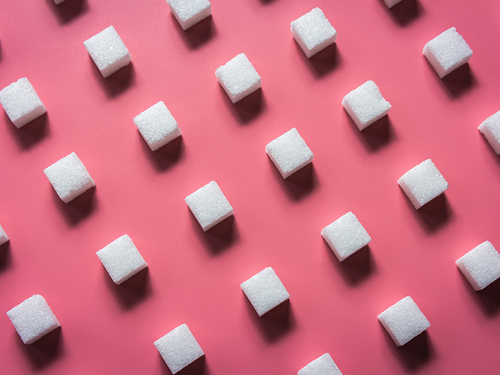Artificial Sweeteners: Stay Away
By Riley Romazko
 Humans naturally adore the taste of sweet foods and compounds. It is a blessing and a curse to be able to enjoy a sweet treat. The recent obesity epidemic has been linked to excess consumption of foods, particularly fried foods, convenience foods, processed foods, and added sugars. Nevertheless, recent advances in nutritional sciences have led to sugar replacements in many foods and drinks in order to reduce calories & added sugars. Aspartame, Saccharin, Sucralose, and Xylitol are some examples of common artificial sweeteners (AS). While many believe that they are benefiting themselves by using artificial sweeteners in order to reduce calories & sugar, studies show that they may actually be causing negative effects.
Humans naturally adore the taste of sweet foods and compounds. It is a blessing and a curse to be able to enjoy a sweet treat. The recent obesity epidemic has been linked to excess consumption of foods, particularly fried foods, convenience foods, processed foods, and added sugars. Nevertheless, recent advances in nutritional sciences have led to sugar replacements in many foods and drinks in order to reduce calories & added sugars. Aspartame, Saccharin, Sucralose, and Xylitol are some examples of common artificial sweeteners (AS). While many believe that they are benefiting themselves by using artificial sweeteners in order to reduce calories & sugar, studies show that they may actually be causing negative effects.
While intake of AS has been permitted by the FDA, a number of studies in the last decade have warned about the potential negative effects. Data from several human and animal studies have indicated genetic modifications of fat tissue, changes in the hippocampus of the brain, and disturbance of the gut microflora by AS. Maybe that sweetener in your coffee isn’t doing you any good.
Despite the common belief that AS may reduce calories and in turn reduce fat, a study shows otherwise. Ironically, 1400 participants in a cohort study showed increased body mass index (BMI) and waistlines from AS (Chia et al. 2016). It is common for individuals to overcompensate the little to no calories in AS by eating more food and therefore, end up with a higher calorie intake. The overeating is believed to be due to the sweet taste stimulating the brain and in turn, increasing appetite and food consumption. AS activate several hormones that increase insulin productions and stimulate hunger. Similar mechanisms have also been seen in children.
As far as digestive health, AS do not do any favors. The subtle layers of friendly gut bacteria can be easily disturbed. Many experiments have shown changes in beneficial microflora and even an increased fasting glucose (Palmnas et al. 2014). The gut is dubbed the “second brain” and affects many functions of the body including cognitive and immune function. Another study of pregnant women consuming AS reported diagnosis of asthma or allergies in their children (Maslova et al. 2013). In addition to the microflora effects by AS, various metabolic disorders may also arise. Both frequent intake and prolonged consumption of AS are associated with with type 2 diabetes and obesity. There is almost too much to say here in regards to artificial sweeteners & their negative effects.
If that isn’t enough for you, a positive correlation between AS and kidney disease & free radical synthesis has also been found. Aspartame, a common sweetener, has been in critique by many scientific professionals. Its influence on the nervous system was studied by Lindseth et al. 2014. This study showed that high amounts of aspartame were linked to impaired cognitive abilities, specifically spatial orientation & memory. Higher intake has also been linked to depression and other mood and/or behavioral disorders.
Certainly, an unbiased blogger must accompany an article with both positive and negative sides, but I find it rather difficult to come up with any positive effects of AS. However, the negative side effects of AS are likely correlated to high doses and long durations of use. Sporadic use is unlikely to pose the same risks. The FDA has indeed stated that AS are safe and low intake is unlikely to cause the effects listed above. However, more research is emerging and society must be aware of the potential consequences of AS. Further studies should show the long-term effects of AS and rare intake is unlikely to harm you. So, that Splenda once in a while probably won’t kill you!
https://rrfitness2u.com/blog/f/artificial-sweeteners-stay-away





